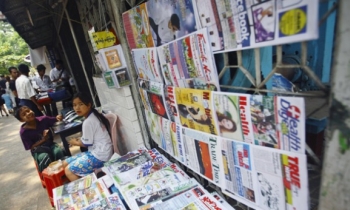Publishers make decisions about what advertising to carry on a regular basis. This week one such decision passed briefly across my desk when I was given the good news that Guardian Unlimited had been added to the media schedule for Playboy's website and television channel. What did we think? We thought not. Without making any moral decisions at all about Playboy and its perfectly legitimate business, there was a danger that it would impact on our brand and that it was inappropriate for a site which is open to all ages.
It is difficult to imagine finding an advertisement for Ann Summers in the Daily Mail, although the Mail's overweening preoccupation with the declining female libido makes it the perfect media environment for the marital aid market. Newspapers seldom carry ads for rivals, and there was an episode several years ago when the fashion glossies turned down advertising from Superdrug because their pricing strategy had upset the smelling salts in the "fine fragrance" industry.
So while the prerogative to pick your advertisers is absolute, it is not surprising that the press take a very different view when advertisers pick their media. In the past few weeks there have been three examples of advertisers seeking clarification of editorial intent before deciding where to spend their dollars. In the US the Los Angeles Times found itself cut from the advertising schedule of General Motors after its award-winning motoring journalist Dan Neil wrote a column calling for the resignation of its top managers. BP has back-pedalled from a memo, again leaked in the US, which said it wanted prior warning of coverage in magazines where it was placing ads. Last week the company softened its stance, saying that the memo had been "a little over the top" and there had been no intention to influence content.
A third and less widely talked about example is that of Morgan Stanley, the US investment bank whose boardroom travails have been filling the columns of the business press. Morgan Stanley toured some of the more influential publications such as the Wall Street Journal to state that its advertisements must be pulled where they were set to run against "objectionable editorial coverage". Any corporation has the right to spend - or not spend - money where it wishes. One can understand the irritation of GM's CEO when he realises he is paying the wages of a journalist who is calling for his head, even if one can't condone it. However, this is different from taking the stance of an "ethical" company and then seeking to influence media coverage through financial muscle - there is nothing ethical about seeking to derail freedom of expression. BP's clarification of its intention to avoid "insensitive" advertising - for instance advertising next to stories of a refinery fire - is a flimsy fig leaf for what was originally a request for pre-publication clearance of any articles relating to the company or the wider energy industry.
The onus here is on the media to resist advertiser demands over content - as long as there is unanimity of approach then the ill-judged impulse of advertisers to meddle can be nullified. In 1997 there was a furious reaction from the US magazine industry when Chrysler Corp asked magazine sales staff to tell it about potentially "offensive or provocative" editorial ahead of publication. At the time Esquire in the US dropped a story which had homoerotic scenes so as not to offend Chrysler. The upshot was a much tougher stance by magazine trade bodies which stopped copy clearance being given to advertisers.
But there is another issue in here as well - advertisers who "menace" publications are presumably being advised by armies of well-paid public relations operatives and media buying agencies. It is impossible to think that anyone who charges a professional fee for consulting on press relations or image would think it a good idea for a client to risk exposure as a corporate bully by approaching publishers in such a way. Maybe in the US a series of troubling stories about the political pressure on the press has given the green light to the corporations who see an opportunity to benefit from an industry already wracked by self-doubt.
If an advertiser is stupid enough to ask for editorial favours in return for advertising money, and a publisher craven enough to give it, then the advertiser-funded model for news media is in serious trouble. What one wonders, though, about the past fortnight is whether the sudden rash of examples might point to far more going unreported and perhaps even a number which have been effective. It is the job of the publishing industry and, it has to be said, the advertising industry to keep clients on the straight and narrow if they cannot do it themselves. Without this all three sides of the triangle are in deep trouble.









